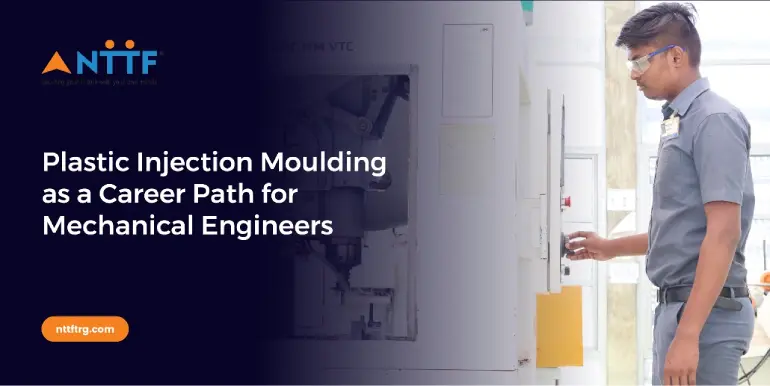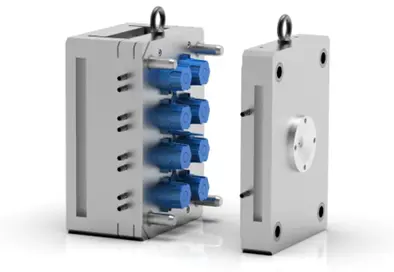Plastic Injection Moulding as a Career Path for Mechanical Engineers
August 17, 2024 2024-10-11 15:07Plastic Injection Moulding as a Career Path for Mechanical Engineers


Forget fancy factories with robots and lasers for a second. The real magic behind all that plastic items we use every day often happens behind the scenes. It all starts with a crucial but unseen hero: the plastic injection mould. These precision-crafted tools are the unsung champions that take molten plastic and transform it into a mind-boggling variety of parts. Think about it – from the lightweight components that keep your car running smoothly to the medical devices that play a vital role in healthcare, plastic injection moulds leave their mark on a massive range of products that touch every aspect of our lives.
This article dives deep into the fascinating world of designing these moulds. It’s the perfect career path for mechanical engineering graduates who enjoy a good challenge and the satisfaction of seeing their ideas go from concept to creation. As a plastic injection mould design engineer, you’ll be the one figuring out how to translate those innovative ideas into moulds that can efficiently and precisely churn out all sorts of plastic parts. It’s a role that requires a blend of creativity, technical know-how, and problem-solving skills – basically, a dream job for anyone who gets a kick out of making the seemingly impossible, possible.
Shaping Industries, Shaping Careers:
The landscape of manufacturing is heavily reliant on plastic components, leading to a burgeoning demand for skilled professionals. By equipping themselves with expertise in tool engineering and design through postgraduate studies, mechanical engineers can position themselves as crucial figures across numerous sectors. This specialized knowledge allows them to contribute to the development and production of innovative plastic parts used in everything from consumer electronics and automotive components to medical devices and aerospace applications. Look at the key sectors.
Automotive Architects of the Future:
Medical Device Innovators on the Frontlines:
Imagine the intricate tools used in surgery or the life-saving precision of syringes. These medical marvels rely on a crucial behind-the-scenes player: plastic injection moulds.
Mold design engineers are the masterminds who craft these moulds, ensuring the mass production of affordable, sterile, and highly precise medical equipment. From simple syringes to complex surgical instruments, their expertise shapes the tools that safeguard our health and revolutionize medical treatments.
So, if you’re a mechanical engineer passionate about healthcare and social impact, consider a post-graduation in tool engineering. It could be your chance to make a real difference, one meticulously designed mould at a time.
Packaging Visionaries Shaping Consumer Goods:
The world of consumer goods is heavily influenced by plastic injection moulds. Mould design engineers help bring innovative and functional packaging solutions to life. Their expertise ensures the protection and preservation of products, from delicate food and beverages to sensitive electronics and pharmaceuticals. By designing moulds for tamper-evident packaging or solutions that extend shelf life, they contribute to reducing food waste and ensuring the safe delivery of critical goods. After successfully completing mechanical engineering, considering a 2-year postgraduation degree in Tool Engineering or a postgraduate diploma in tool design can elevate your skillset and position you for success in fulfilling packaging careers.
Consumer Goods Creators: Beyond Functionality:
The influence of plastic injection moulds extends far beyond traditional applications. They are used to create a vast array of consumer goods, from the toys that spark children’s imaginations to the sporting equipment that fuels our athletic pursuits. Mould design engineers don’t just focus on functionality; they ensure the final product is aesthetically pleasing as well. From sleek and ergonomic housings for electronics to intricate details on toys, their work adds a touch of design to the everyday objects that enrich our lives.
A Future-Proof Career Choice:
Unlike technologies susceptible to rapid obsolescence, plastic injection moulding is a constantly evolving field. Advancements in material science are constantly pushing the boundaries of what’s possible, while mould design techniques are continuously refined to achieve even greater precision and efficiency. This ongoing innovation ensures plastic injection moulding remains a cornerstone of modern manufacturing. As a result, plastic injection mould design positions itself as a compelling and future-proof career path for Mechanical Engineers. Furthermore, pursuing a Post graduate diploma in tool design, not only offers a long-term job security but also the immense satisfaction of contributing to the creation of products that improve our lives in countless ways.
The ever-evolving landscape of manufacturing demands skilled engineers, and those with expertise in plastic injection mould design are in high demand. A career in this field offers Mechanical Engineering graduates, including those considering further education after their diploma, the opportunity to be indispensable players, shaping the plastic components that define our world.
So, are you ready to dive into this dynamic and rewarding field and become a mould maker of the future? Are you yearning to push the boundaries of what’s possible in manufacturing? But, confused which is the best PG course available after Mechanical Engineering? Then, look no further. A Postgraduate Diploma in Tool Design or a Postgraduate Degree in Tool Engineering could be your gateway to becoming a true artisan of the mould. These programs aren’t just about expanding your knowledge base; they’re about honing your skills. You’ll master the art of precision design and learn to harness cutting-edge technologies that are reshaping the industry. It’s a journey of transformation, where your theoretical understanding blossoms into practical expertise that’s highly sought after in the job market.








